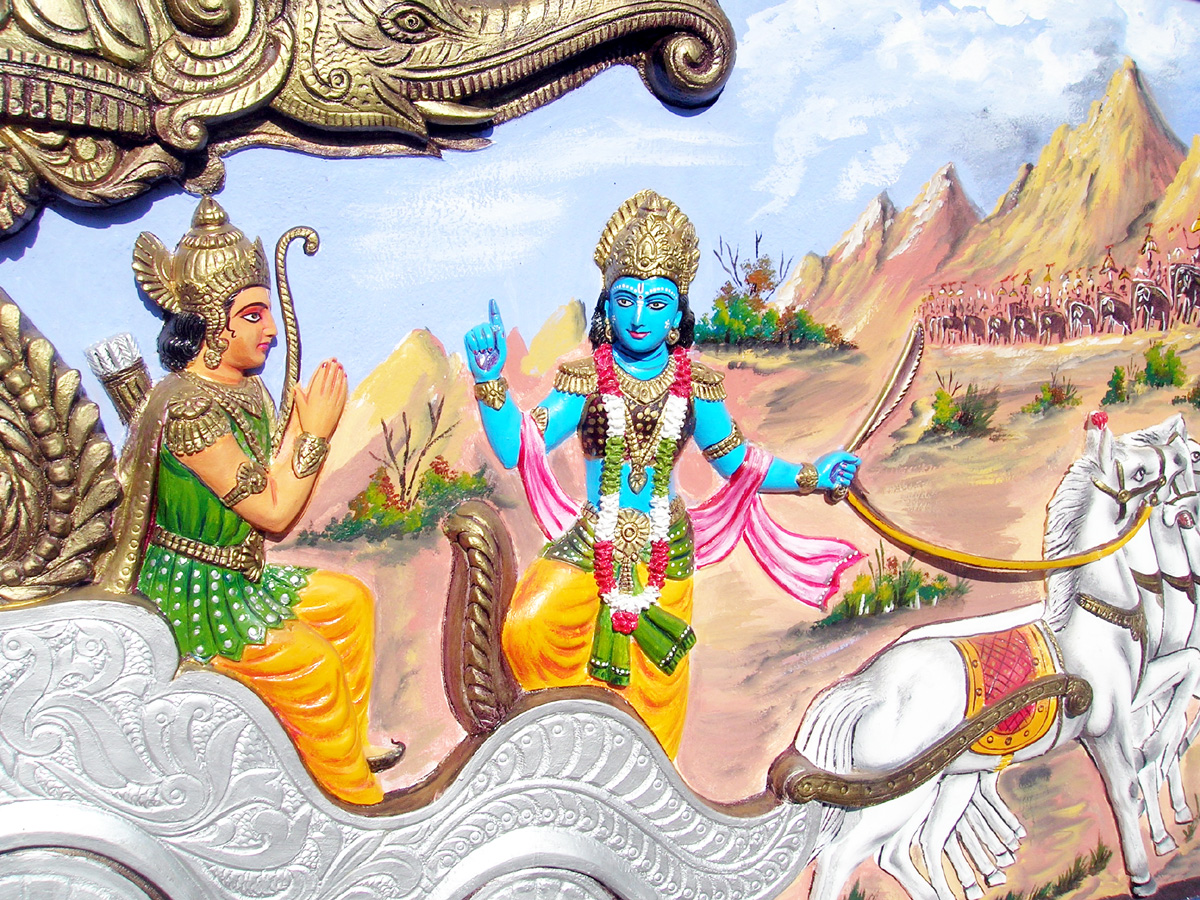No products in the cart.
The sixth Parva of Mahabharata is Bhishma Parva, which means the book of Bhishma, recites the events of the first 10 days of the 18 day long Kurukshetra war between the Pandavas army and the Kauravas’ army. It consists of 4 upaparvas and almost 124 chapters. It also contains one of the most popular verses of the Hindu Mythology, The Bhagvad Gita. The summaries of the sub parvas are:
Jambukhandavinirmana Parva
This is the first sub parva of Bhishma Parva and consists of 10 chapters. The story picks up from where it left. The Pandavas and Kauravas face to face at the battlefield. The Parva begins with a meeting of the two sides where they agree to the rules of the war. The grandfather to both the Pandavas and the Kauravas, Veda Vyasa, granted Dhritarashtra, who was blind, with the boon of eye of eyesight so that he could witness the destruction of the upcoming war. However, Dhritarashtra declined the boon, knowing what great misery was about to break out during the war. Rishi Veda Vyasa tried his last attempt to convince Dhritarashtra to stop the war and make peace, but Dhritarashtra finally accepted that his sons did not obey him at all. Vyasa tried to make him realize in all ways the ill effects of war and the misery caused by it. No matter which sides wins a war, the destruction is certain for both sides of the war. Vyasa grants the boon to Sanjaya to watch everything of the world and the war and describe it to King Dhritarashtra. Sanjaya starts by describing the beautiful world around him, its inhabitants and the wonderful plants and nature. This description highly upsets Dhritarashtra as his sons are choosing war forcefully and are in the path of destroying the beauty and peace of the world.
Bhumi Parva
The Bhumi Parva is the shortest sub parva of the Bhishma Parva consisting of only two chapters. The detailed description of the universe by Sanjaya continues in these chapters. He describes the rivers, the landscapes and the mountains. The four popular cities of Manga, Masaka, Mandaga and Maanasa are also described here. These cities were popular as the Brahmins and the Kshatriyas lived together there, signifying the idea that people with conflicting ideas can live and even prosper together. These cities didn’t even have kings as their citizens were peace loving and law abiding. He even described the planets at night and the Moon. He continued to describe the phases and eclipses of the Moon and how it controls the tides on the Earth.
Bhagvad Gita Parva
This Parva is the most of the popular Parvas in the Mahabharata is the Bhagvad Gita Parva. It is still one of the most celebrated books of Hindu Mythology. It symbolizes the beliefs and makes up the crux of Hinduism. The Bhagvad Gita remains the best part of the entire Mahabharata as it bestows welfare to all of mankind.
The first day of the war begins, under the commandership of Bhishma. The Kaurava army consisted of over 100000 war elephants, over 1 crore chariots, about 1 billion horsemen, 10 billion archers and over 100 billion soldiers carrying swords and shields. Yudhishthira was grieved when he learned about the magnanimous size of the Kaurava army. However, Arjuna still believed that the victory in a war does not depend on the size of the armies, rather it depends on the intentions of each side.
Then, the famous dialogue between Arjuna and Krishna began. Arjuna’s mind was in a conflict when he reached in the center of the battle field in between the two armies. This conflict arises after seeing his family members, friends, people he knew, on the other side. He grew up with the Kaurava brothers and was grieved with the feeling that he had the responsibility of killing his own cousins with whom he had shared his childhood. He wonders whether the cause and the need of war was justified. He then told Krishna that he was greedy neither for a victory nor for a kingdom, and asked him whether the war is justified or not. Arjuna thought that war isn’t worth any of the efforts and the bloodshed if he succeeds in getting their side to victory. Krishna then clears his doubt by answering his questions in many kinds of ways. Lord Krishna talked about Karma Yoga,i.e selfless devotion to action. His entire speech was centered around the duties of a Karma Yogi. A Karma Yogi always follows his dharma, in all circumstances. He does actions without the concern of the results, and is above worldly pleasures. These words spoken by Krishna, is the crux of the Bhagvad Gita.
Yudhishthira was also very grieved in these moments before the start of the war. Just before the start of the historic war, Yudhishthira got off his chariot, took off his armor, walked up to the Kauravas side and bowed his head in front of them. Seeing this act of humility, even the rest of the four brothers joined him and bowed in front of the Kauravas army. They meet the Kaurava brothers and also bow before Bhishma, Drona and Kripa to take their permission to battle them to death. The Pandava brothers respected them a lot, as they were their mentors while they were growing up. Bhishma was stunned at the amount of respect given by the brothers to him and wished them victory. Even the other generals were amazed at this sight and their eyes were filled with tears and sense of respect for the Pandava brothers, well before the start of the war. After this event, Yudhishthira and the Pandava brothers returned to their sides. Then the trumpet for the war was blown and the Great War officially began then.
Bhishmayadha Parva
This is the longest and the last Parva of the Bhishma Parva spanning across almost 82 chapters. It describes the happening and intricacies of the first 10 days of the eighteen day long war. The first day of the war caused a lot of destruction. The dust and the flying arrows obscured the Sun. The arrows shot by both sides, and the crashing of war weapons of the two sides generated a huge amount of noise. Bhishma engaged in a long battle with Abhimanyu, Arjuna’s son. However, it resulted in a draw. In the first day of battle, Salya killed Uttara. However, Uttara had crippled the chariot of Salya in his long face off with him. Sweta, a warrior of the Pandavas army killed many soldiers from the Kauravas side. He was killed by Bhishma towards the end of the first day. Numerous soldiers of both sides were killed by the end of the first day of the war. When the second day of the war begins, Bhishma engaged in a furious battle with Arjuna, which was also ended in draw. Bhima slayed the King of the Kalingas on the second day of the war. It was a major feat for the Pandava army on the second day. The king of Nishadas, who were fighting for the Kauravas, was also killed on this day. On the second day too, thousands of soldiers from both side of the armies were killed and lot of destruction was caused. The third and fourth days of the war caused huge amounts of bloodshed, as many Pandava and Kuru soldiers were killed. Bhima killed 8 of the 100 Kaurava brothers on the fourth day of the war, shocking Duryodhana. This parva contains the description of the war till its 10th day. By the 9th day, almost 100 million warriors had been slaughtered. Bhishma had also made attempts to be killed by Krishna, as he knew that dying in the hands Lord Krishna would mean a journey to heaven. However, Arjuna did not let that happen as he did want to break Krishna’s vow of not fighting in the battle.
At the end of the 9th day of war, the Pandavas were unable to figure out a way to defeat Bhishma. So, the Pandava brothers approached him unarmed and asked him the way to defeat him. Bhishma said that he had to fight valiantly, as he was a trained warrior and giving up was against his dharma as a warrior. Bhishma suggested that the only way to stop him was to place Shikhandi in front him, as he was under his oath to never fight Shikhandi. Shikhandi was the girl child of Drupada, the king of the Panchalas. The Pandavas deployed this strategy on the 10th day and Bhishma could not attack as in front of him he saw Shikhandi.Bhishma’s body was fatally injured with a mesh of arrows pierced in his body. He was lying on a bed of arrows and everyone on both sides of the war stopped and paid tribute to the great and one of the most experienced warriors present in the battlefield. Immediately medical help took Bhishma back to the camp with the attempt to cure him.

18 Parvas of Mahabharata
1. Adi Parva (the Beginning)
2. Sabha Parva (the Assembly Hall)
3. Vana Parva also Aranyaka-parva, Aranya-parva (the Forest)
4. Virata Parva (Virata)
5. Udyoga Parva (the Effort)
6. Bhishma Parva (Bhishma)
7. Drona Parva (Drona)
8. Karna Parva (Karna)
9. Shalya Parva (Shalya)
10. Sauptika Parva (the Sleeping Warriors)
11. Stri Parva (the Women)
12. Shanti Parva (Peace)
13. Anushasana Parva (the Instructions)
14. Ashvamedhika Parva (the Horse Sacrifice)
15. Ashramavasika Parva (the Hermitage)
16. Mausala Parva (the Clubs)
17. Mahaprasthanika Parva (the Great Journey)
18. Svargarohana Parva (the Ascent to Heaven)






